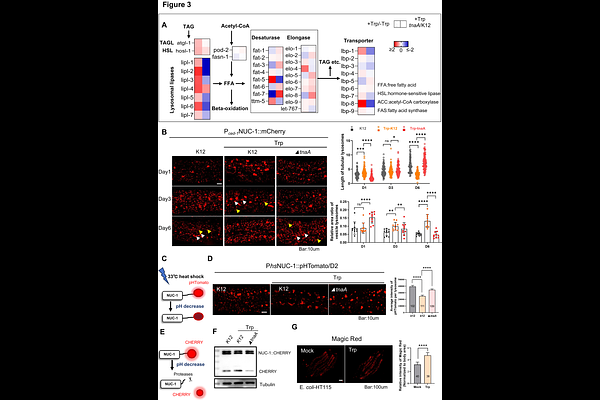Microbial Tryptophan Metabolism Activates Host Lysosomal Activity to Facilitate Lipid Breakdown and Ameliorate Hepatic Steatosis

Microbial Tryptophan Metabolism Activates Host Lysosomal Activity to Facilitate Lipid Breakdown and Ameliorate Hepatic Steatosis
Zhang, K.; Luo, Z.; Li, Y.; Chen, Y.; Wang, L.; Liu, Y.; Yang, R.; Li, Q.; Zhao, J.; QI, B.; Shan, Z.
AbstractLysosomes are central to lipid metabolism, yet how gut microbiota-derived metabolites regulate lysosomal function to influence host lipid homeostasis remains unknown. Here, we identify an evolutionarily conserved mechanism in which bacterial tryptophan metabolism activates lysosomal activity to promote lipid breakdown. By developing a lysosomal-responsive lipid reporter in C. elegans to screen for bacterial metabolic states that modulate host lipid storage, we discover that E. coli tryptophan catabolism via tryptophanase TnaA induces lysosomal lipid chaperone LBP-8, driving lipid mobilization. Moreover, tryptophan metabolites enhanced lysosomal acidification and degradation capacity, while genetic disruption of lysosomal regulators reversed these effects. Strikingly, bacterial tryptophan metabolism further promoted mitochondrial {beta}-oxidation through lysosomal lipase activity. This pathway was conserved in mammalian hepatocytes, where E. coli-derived tryptophan metabolites enhance lysosomal function and reduce lipid accumulation. In high-fat diet mice, restoring gut bacterial tryptophan metabolism alleviated hepatic steatosis. Our work uncovers microbiota-regulated lysosomal activation as a critical axis in lipid homeostasis, highlighting its potential as a therapeutic target for metabolic disorders linked to lysosomal dysfunction.